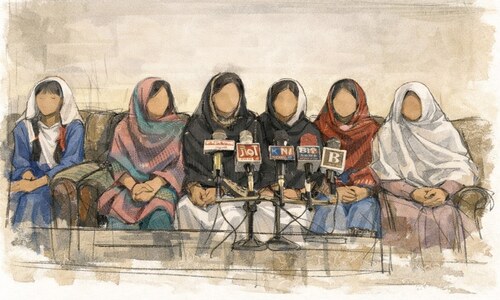Muhammad Aslam Khan’s youngest daughter was only 15 days old when he passed away in an ill-fated charity boxing bout in January. His oldest daughter is only two years of age.
Aslam came from a humble background. His father passed away in 2015, leaving behind nine children — five daughters and four sons — and Aslam was the eldest son. Aslam was only 21 when his father died. And now he is gone, too, at 26. He was the sole breadwinner for his family and support for his still struggling younger brothers and sisters.
Aslam worked as a gatekeeper at the office of the Election Commission of Pakistan (ECP) in Pishin. Apart from his full-time job at the ECP, Aslam also fought as a professional boxer and was only behind Muhammad Waseem Falcon in local boxer rankings.
According to Sardar Kakar, Aslam’s coach and lifelong mentor, Aslam loved his family and wanted to do much for them. At the time of writing this piece, Aslam’s mother is ill and admitted to a hospital in Quetta. Kakar also reveals that he is trying his best to get the ECP job transferred to Aslam’s brother after the boxer’s untimely demise, to ensure the family does not lose the means to make ends meet.
“Aslam was very obedient and a good kid. He was like my own child. I have seen him grow. Obviously, you cannot do much but accept Allah’s decisions, but I will try my best to support his family like it were my own,” says Kakar.
Kakar is not alone in pledging support to Aslam’s family. The General Secretary of the Pakistan Boxing Council (PBC), Kaleem Ahmed Azad, has also vowed to take responsibility for Aslam’s daughters’ education and well being.
The controversial death of a Pakistani boxer in the ring during a charity bout raised several questions. In search of answers to those difficult queries, Eos spoke to the boxer’s coach and colleagues
But why did it even come to this?
A week after Aslam’s death, which stunned Pakistan, the PBC held a press conference to ‘clarify’ rumours that had been floating around about the circumstances of the tragic accident. There had been plenty of speculations concerning the conditions the ill-fated bout had been held in, about Aslam’s fitness, his boxing qualifications and the reasons for his subsequent death.
Contrary to the initial assertions on the media that the charity match in which Aslam lost his life was an illegally organised fight, the PBC asserts that it was, in fact, held under the supervision of the PBC.
Kakar also puts an end to the rumour that there wasn’t any medical help or ambulance nearby by. He calls this completely baseless. “As soon as Aslam fell down, the doctors went inside the ring. They checked his blood pressure — which at the time was normal — and advised to take him to the hospital. We took him to a private hospital, where his condition deteriorated.
“The cause of Aslam’s death was not the punch but the blow he suffered on his head after he fell down in the ring,” Kakar clarifies.
As the PBC and the boxing community in the country were coming to terms with what had happened, a few people resorted to below the belt attacks, not only on the PBC but on Aslam as well. Azad dispels the notion that Aslam was unfit. “Not only was Aslam an international athlete, he was an international boxer. It is unfortunate to see his name being dragged through the mud by calling him ‘unprofessional’,” says Azad.
“Aslam had represented Pakistan both at the national and international levels. He had fought four professional fights, two of which are on his record. At the time of his death, he was Pakistan’s cruiser-weight champion, a title he had won only on January 9 in Peshawar,” adds Azad.
Aslam was a supremely fit boxer and, according to Azad, he was in “excellent shape and condition.” Kakar, who says Aslam was training hard two to three hours daily in the gym, corroborates his claim.
Qambar Ali Hamdani, a professional boxer with the PBC, also dispels rumours that there are zero checks and balances for boxers’ safety and that Aslam was fighting against an opponent from a different weight division in the charity match. “We sign three forms when we participate in professional events for our licence. One is our medical form, the other two are consent forms, signed by the next of kin or coach and the boxer himself.
“Aslam Khan was a cruiser-weight champion. The weight category ranges from 79.37kg to 90.71kg. There is another form that’s signed by the boxers just before the fight. When you are about to face your opponent, you give your consent on a form to fight, where the weight of both the boxers is mentioned,” Hamdani clarifies.
Then why was there so much criticism levelled against PBC and its alleged lapses? Azad claims that because the PBC has a strict code of rules and regulations, some people have problems with the organisation and its workings.
“We can’t afford to compromise on the safety regulations because we can’t risk anyone’s life. These are our kids. We want them to go back to their families safely. Why would we ever want to risk their lives?” exclaims a visibly shaken Azad.
Hitting back at PBC’s critics, Azad says that the people who are criticising the PBC are the same who have been competing under its supervision for the last few months.
“They are expected to understand the gravity of the situation before commenting on things. However, it was very, very unfortunate to see how they commented irresponsibly without any proof, and without a concrete investigation,” Azad says.
It is pertinent to mention here that Muhammad Waseem, commonly known as Falcon in the boxing circuit and Pakistan’s top boxer, has been the most vocal of critics. He has publicly criticised Aslam and the PBC, stating that “You need to prove yourself before you can obtain a licence to become a professional boxer”, but that “here anyone can stand up and organise his own professional event.”
In response to Waseem’s comments, Kakar wants to know that if Waseem had such issues with the PBC, why did he fight under the PBC and also take a hefty amount from the Punjab government.
“I sent Aslam to Egypt and to fight many other fights out of my own pocket,” says Kakar. “I don’t want any money. I just want the authorities to help his family members in their time of need. Our politicians promise rewards and relief only to later disappear. Please don’t do the same in Aslam’s case. Help his family.”
The PBC, on its part, has set up a fundraiser for Aslam’s family members. You can donate here.
The writer is a member of staff He tweets @HumayounAK
Published in Dawn, EOS, March 7th, 2021

































